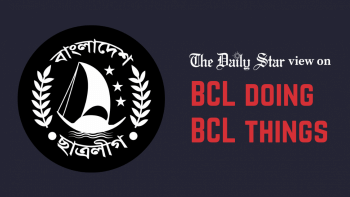A promising anti-bullying policy

We applaud the government for issuing an anti-bullying policy for educational institutions, which provides a clear definition of verbal, physical and cyber-bullying and contains provisions for punishment of students, teachers and members of the governing body who engage in such aggressive behaviour. Depending on the severity of the violence, criminal cases can also be filed against perpetrators. Given how pervasive bullying is across educational institutions in Bangladesh, and the debilitating impact such normalised violence has on children and young adults, there is no doubt that the policy, if implemented, can help create a safe environment in which students can learn and thrive, without fear of harassment, humiliation and violence.
The High Court directed the concerned authorities to formulate such a policy following the suicide of a ninth grader at Viqarunnisa Noon School and College – who reportedly took her life, unable to bear the humiliation of her parents by a teacher. Although it has taken the authorities concerned four and a half years to comply with the directive, we are glad that steps have finally been taken to address the issue in a holistic manner. The policy, for instance, proposes that CCTV cameras be set up, complaint boxes be installed, anti-bullying and anti-ragging days be observed, and bullying and ragging prevention committees be formed in all institutions. Moreover, it mandates hall authorities to inform the higher authorities about any incident of ragging and bullying.
Undoubtedly, the policy is a promising one on paper. The question moving forward, however, is: will it be implemented? More than a decade has passed since the High Court mandated that sexual harassment prevention committees be formed in educational institutions, but only a handful of schools and universities have thus far formed and operationalised such committees, in the absence of any initiative or monitoring from relevant authorities to ensure compliance with the HC directive. How can we be confident that the anti-bullying policy will not meet the same fate? It is essential that that the authorities concerned take adequate steps to create awareness about the policy, monitor its effective implementation across the country and take action against administrations which fail to act accordingly.
The other pressing concern when it comes to bullying and ragging is the identity of the perpetrators: what happens if they are found to be students or teachers affiliated with the ruling party? We have witnessed the widespread impunity enjoyed by ruling party cadres across campuses in the country, with the administration, in an over-whelming majority of cases, turning a blind eye towards their "rule of terror." Who exactly will ensure compliance with the policy if the authorities themselves condone such condemnable practices? Policies alone, no matter how progressive they are, cannot make our campuses safer.
For far too long, bullying and ragging has been dismissed as insignificant, with victims forced to suffer in silence. We have no doubt that the new policy proposes meaningful interventions. We hope that the education ministry will play an equally commendable role in ensuring its implementation, beginning with raising awareness among students, teachers, parents and administration about what exactly constitutes bullying and why it's wrong.


 For all latest news, follow The Daily Star's Google News channel.
For all latest news, follow The Daily Star's Google News channel. 





Comments